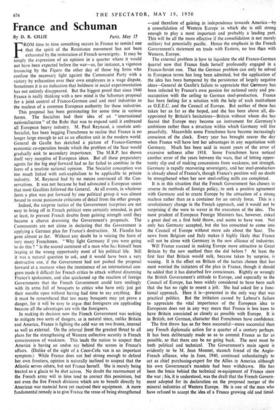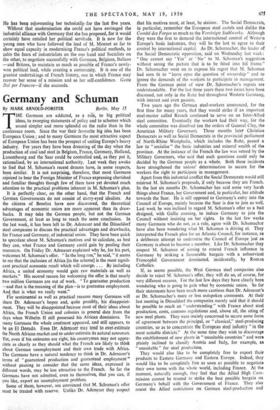France and Schuman
FROM time to time something occurs in France to remin 1 one that the spirit of the Resistance movement has not been exhausted by the restoration of French sovereignty. It may be simply the expression of an opinion in a quarter where it .would not have been expected before the war—as, for instance, a vigorous trouncing by the Figaro the other day of those big firms who confuse the necessary fight against the Communist Party with a victory by exhaustion over their own employees in a wage dispute. Sometimes it is an indication that boldness in social experimentation has not entirely disappeared. But the biggest proof that since 1940 France is really thinking with a new mind is the Schuman proposal for a joint control of Franco-German coal and steel industries as the nucleus of a common European authority for these industries.
This proposal has been germinating for some time in various forms. The Socialists had their idea of an " international nationalisation " of the Ruhr that was to expand until it embraced all European heavy industry. M. Paul Reynaud, a resolute anti- Socialist, has been begging Frenchmen to realise that France is no longer large enough to act as an effective unit in the modern world. General de Gaulle has sketched a picture of Franco-German economic co-operation beside which the problem of the Saar would gradually sink to secondary importance. The M.R.P. has shown itself very receptive of European ideas. But all these preparatory agents for the big step"forward had so far failed to combine in the form of a resolute national opinion. The Socialist conception was too much linked with anti-capitalism to be applicable to private industry. M. Reynaud had by no means convinced all the Con- servatives. It was not because he had advocated a European union that most Gaullists followed the General. At all events, in whatever form a plan was put forward byv one political group it was almost bound to rouse passionate criticisms of detail from the other groups.
Indeed, the surprise tactics of the Government (surprises are not easy to bring off in French politics) were certainly intended, in part at least, to prevent French doubts from gaining strength until they became a chorus drowning the Government's proposals. The Communists are not alone in declaring that the Government is applying a German plan for France's destruction. M. Flandin has gone almost as far. Without any doubt he is voicing the fears of very many Frenchmen. " Why fight Germany if you were going to do this ? " Is the soured comment of a man who ha3 himself been leaping at the wrong opportunity most of his political life. Still it was a natural question to ask, and it would have been a very destructive one, if the Government had not pushed the proposal forward at a moment when the imminence of an international con- gress made it difficult for French critics to attack without disarming France's spokesmen, and also quickened up the reaction of foreign Governments that the French Government could turn smilingly with its arms full of bouquets to critics who have only just got their mouths open without having had time to say anything. But it must be remembered that too many bouquets may yet prove a danger, for it will be easy to argue that foreigners are applauding because all the advantages are with the foreigners.
In making its decision now the French Government was seeking to mitigate two sorts of dangers, as is natural since, unlike Britain and America, France is fighting the cold war on two fronts, internal as well as external. On the internal front the greatest threat to all plans for the strengthening of Western collective security is French consciousness of weakness. This leads the nation to suspect that America is having an undue say behind the scenes in France's affairs. (Dislike of the sight of a Coco-Cola van is an important symptom.) While France does not feel strong enough to defend her own frontiers, opinion is naturally inclined to suspect that the Atlantic serves others, but not France herself. She is merely being treated as a glacis to be shot across. No doubt the rearmament of the French army will in time tend to correct this pessimism, but not even the five French divisions which are to benefit directly by 'American war material have yet received their equipment. A more fundamental remedy is to give France the sense of being strengthened
—and therefore of gaining in independence towards America—by a consolidation of Western Europe in which she is still strong
enough to play a most important and probably a leading part. This will be all the more effective if the consolidation is not merely military but potentially pacific. Hence the emphasis in the French Government's statement on trade with Eastern, no less than with Western, Europe.
The external problem is how to liquidate the old Franco-German ttuarrel now that France finds herself profoundly engaged in a Franco-Soviet one. That the German problem can only be solved in European terms has long been admitted, but the application of the idea has been hampered by the persistence of largely negative ideas—General de Gaulle's failure to appreciate that Germany has been infected by France's own passion for national unity and pre- occupation with the ceiling to German steel-production. France has been feeling for a solution with the help of such institutions as O.E.E.C. and the Council of Europe. But neither of these has taken her as far as she hoped, and she has been above all, dis- appointed by Britain's hesitations—Britain without whom she has feared that Europe may become an instrument for .Germany's ambitions rather than a structure within which Germany will live peacefully. Meanwhile some Frenchmen have become increasingly conscious of the clock. Every year has brought nearer the day when France will have lost her advantages in any negotiation with Germany. Much has been said in recent years of the error of excessive softness after 1918. Some Frenchmen have noticed another error of the years between the wars, that of letting oppor- tunity slip and of making concessions from weakness, not strength. Germany is rapidly recovering sovereignty, and her steel-production is already ahead of France's, though France's position will no doubt be strengthened when her new steel-rolling mills are completed.
It is in this situation that the French Government has chosen to reverse its methods of foreign policy, to seek a positive agreement with Germany and to create Europe by the attraction of a strong nucleus rather than as a container for an unruly. force. This is a revolutionary change in the French approach, and it would not be surprising if she were to waver in the execution of the idea. The most prudent of European Foreign Ministers has, however, risked a great deal on a first bold throw, and seems to have won. Not only has Germany accepted, but she has consented to come into the Council of Europe without more ado about the Saar. The news from Belgium and Italy makes it highly likely that France will not be alone with Germany in the new alliance of industries.
Will France succeed in making Europe more attractive to Great Britain by the new method than she did before ? At least the first fear that Britain would sulk, because taken by surprise, is waning. It is the effect on Britain of the tactics chosen that has most worried the initiators of the plan in France, though it should be added that it has disturbed few consciences. Rightly or wrongly
the British Government's attitude to Europe, and especially to the Council of Europe, has been widely considered to have been such that she has no right to resent a jolt. She had asked for a func-
tional approach. Here it is—presented in the only way that was practical politics. But the irritation caused by Labour's failure to appreciate the vital importance of the European idea to
Europeans does not in any way mean that France is less keen to have Britain associated as closely as possible with Europe. It is in British, not German, character that Frenchmen have confidence.
The first throw has so far been successful—more successful than any French diplomatic action for a quarter of a century perhaps. It has been deliberately made so as to commit France as far as possible, so that there can be no going back. The next must be both political and technical. The Government's main agent is evidently to be M. Jean Monnet, staunch friend of the Anglo- French alliance, who in June, 1940, continued unhesitatingly to act as chief purchasing-expert for the Allies in America although his own Government's mandate had been withdrawn. His has been the brain behind the technical re-equipment of France since the war ; his, it is understood, was the draft that the French Govern- ment adopted for its declaration on the proposed merger of the mineral industries of Western Europe. He is one of the men who have refused to accept the idea of a France growing old and timid.
He has been rejuvenating her technically for the last five years.
Without that modernisation she could not have envisaged the industrial alliance with Germany that she has proposed, for it would certainly have entailed her political servitude. It is now for the young men who have followed the lead of M. Monnet so far to show equal capacity in modernising France's political methods, to calm the fears of industrialists on the one hand and Socialists on the other, to negotiate successfully with Germans, Belgians, Italians —and Britons, to maintain as much as possible of France's newly- won political lead, while creating a community. It is one of the greatest undertakings of French history, one in which France may recover her sense of a mission and so her self-confidence. Gesta Dei per Francos—if she succeeds.











































 Previous page
Previous page